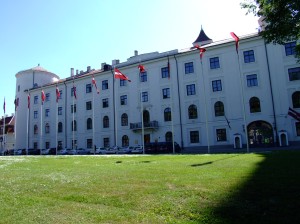Of all the various scams that can take place with EU money, one of the commonest runs something like this:
- Draw up grandiose plans to open a leisure complex in a beautiful location in the countryside. The complex will preferably include a luxuriously-appointed main building, several smaller guest houses, a few ponds, tennis courts and sundry other essentials.
- Fill in the necessary forms to apply for EU co-funding. Make liberal mention of the jobs the leisure complex will provide, the money it wil bring into the rural economy and of course how it will help visitors and locals alike to become more familiar with each other, reinforcing “European-ness” etc. It helps at this stage if you have a contact or two in the food chain between applicants and deciders. In Latvia that’s not too problematic as it’s such a small place that quite possibly friends, friends of friends or family members will be involved somewhere along the way.
- Hey presto, you’ve been accepted. Pass go and collect 50% of the costs of the project courtesy of the EU (including Latvian) taxpayer.
- When the leisure complex is finshed, open for business. This does not necessarily mean you need to advertise, produce brochures or even put a “Welcome” sign outside. If you do put a sign outside for the photos you take to prove you are open for business, don’t be surprised if some miscreants come in the night and steal it. So don’t bother replacing it. Fly the EU flag though, just in case.
- Wait six months or so, hoping no-one who’s got lost in the mist actually turns up to stay. If they do, say you are unfortunately fully booked.
- Resign yourself to the fact that it just isn’t going to work out as a leisure complex. At this point you face a tough choice. Either a) leave it officially as a guest house with just your family living there, b) sell it to another company you own for a knock-down price or c) put it on the market at market value. Luckily, the fact that you only put in half of what it actually cost to construct should mean you can turn a handsome profit even in a depressed housing market.
It’s a simple enough scam, which probably explains why it is so common. In Cesis region, a part of Latvia which I know fairly well, there are at least four examples of this I could drive to within 20 minutes of each other. And there may be another that has recently come to light. According to a report by the excellent investigative journalist Ilze Nagla, newly-elected president Andris Berzins’ rather swanky country home – built with EU funds – is technically a guest house/leisure complex notable mainly for its lack of guests or even indications that it is a guest house.
Berzins was asked about this at his post-election press conference and chose his words carefully when replying, insisting that “no rules were broken.” I’m sure he’s right, and that the rules were very, very carefully scrutinised to make sure they weren’t broken according to the letter of the law. The spirit of the law is something else.
I have a feeling this issue could be the one that ends up biting his backside even more than the tragi-comic manner in which he was elected.
Probably the best thing that can be said in Berzins’ defence – though it is rather a back-handed compliment – is that he didn’t look particularly interested in whether he became El Presidente or not. Some sort of enthusiasm or sense of emotion might have been nice, but he acted more in the manner of a diabetic who has just been told they get a complimentary bottle of cola with every large pizza ordered.
Berzins’ advisers shoud be telling him to sort out the housing issue at the earliest opportunity – and not just because he will soon be entitled to a nice seaside residence in Jurmala entirely at the taxpayers’ expense. Ironically, in this regard he could learn from his predecessor. When Valdis Zatlers came clean about the “envelope payments” he had accepted while working as a doctor, he was vilified. But it also meant that the beginning of his presidency was its lowest point and over the next four years his reputation climbed steadily, ending sky-high with his decision to dissolve the Saeima.
It would be hard for Berzins’ approval ratings to be any lower among everyone but his party pals (MP Iveta Grigule, who proposed him for the presidency acts like a bobbysoxer in the presence of Frank Sinatra when he’s in the room) so he would be well advised to make The House In The Country Scandal his own vrsion of the Brown Envelope Scandal.
A full explanation/admission is a must – otherwise every future meeting with EU colleagues will be just one journalist’s question away from embarrassment. And were he to say “The opportunity was there to work the system and I took it,” he might actually win a bit of respect from a large part of population which is forced to bend the rules just to survive rather than to make another fortune.


